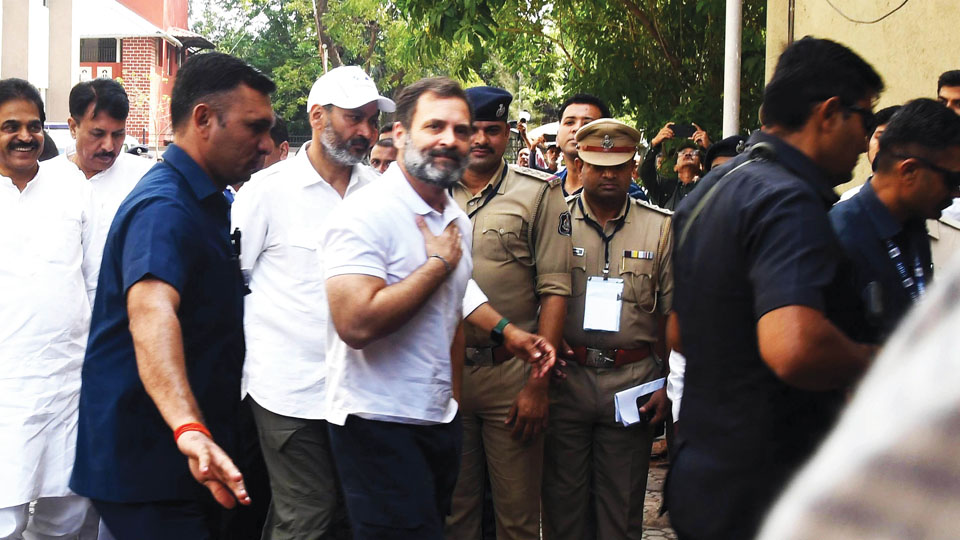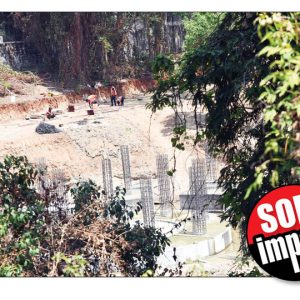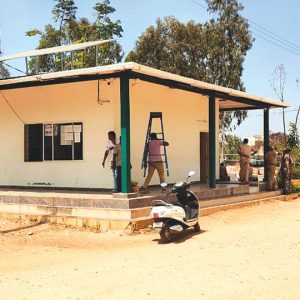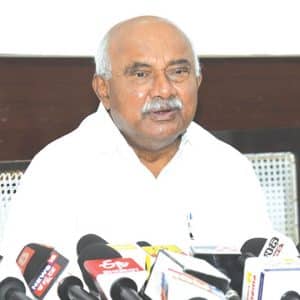
I was surprised to learn from TV yesterday that Congress leader, Lok Sabha MP, Rahul Gandhi was found guilty in a criminal defamation case filed in Surat, Gujarat and sentenced to two years in prison. As expected, soon all hell broke loose in the Congress camp. It was a case filed in 2019 over his remarks about Prime Minister Narendra Modi made in a public speech in Kolar, Karnataka, during the ensuing Parliamentary election. Mentioning the names of two fugitive businessmen Nirav Modi and Lalit Modi, who were accused of cheating the banks, Rahul Gandhi had said, “How come all thieves have the common surname Modi?”
Like Julius Caesar, who once retorted to a cringing convict pleading mercy, saying, ‘What I have said, I have said. Be gone from Caesar,’ the Surat Court has said what it has. Now it is for Rahul Gandhi, who is given 30 days bail to appeal, to go to the next Higher Court in appeal seeking relief and deliverance. It will certainly take long for this case to be played out, probably going beyond the 2024 Parliamentary elections.
My guess is that this judgement by the Surat Court will be a turning point in the political life of Rahul Gandhi and, who knows, in the political history of our country as happened with the 1975 judgement of the Allahabad High Court in the elections case of the then Prime Minister Indira Gandhi. As for the people of our country this is a real political pot-boiler.
The experience of many advocates who have handled defamation cases which come in a package of two-in-one, in the form of Civil Defamation and Criminal Defamation, and that of the complainants and defendants can be described in the words of the celebrated Supreme Court Advocate Fali S. Nariman. He said, “Defamation actions in India are a luxury and a dangerous luxury at that, that they are too often filed in a hurry, and repented only at leisure. And then it is too late. I dissuade clients from filing such actions — civil or criminal.”
Observing the affirmation and adamancy in the Congress challenge, the case could go on and on no end as an unedifying spectacle for the “jollification” of the TV viewers, online portal addicts and the readers of newspapers. All this ‘trials and tribulations’ could have ended with an apology in the Surat Court, not having to go to the Supreme Court as Rahul had earlier done. This was how the case Fali S. Nariman wrote about in his autobiography ended.
Be that as it may, I would like to take this opportunity to share my own experience once again with my readers by republishing my Abracadabra dated January 11, 2018. Today, five years after I wrote it, an opportunity has presented itself to our law-makers to discharge their primary responsibility as law-makers. Personally, I am against any law, specially criminal law, that retains the British colonial flavour. Now read on.
SC upholds journalists’ Freedom of Expression’
Ah! Supreme Court !! It was the only good news for me as a life-long journalist. The newspapers headlined it variously but the one I liked read, “Supreme Court upholds journalists’ Freedom of Expression.”
Before I come to the case in which this journalist-friendly judgement came from the highest Court of our country, let me quote here what the Chief Justice of India (CJI) Dipak Misra said: “There could be some error or enthusiasm in reporting an alleged scam. But we must allow Freedom of Speech and Expression to Press at the fullest. There may be some wrong reporting. For that they need not be hauled up for defamation.”
The reason for the people, specially those whose name is connected with a scam, scandal or an offence, to rush to the Court and file a criminal or civil defamation case, at the drop of a hat as they say, is that our Constitution does not separate the Right of “Freedom of Speech and Expression” from that of a citizen of our country and the journalists who work for the print and electronic (TV, radio and now the social) media. This has inhibited the media from taking, what we call, “poetic liberty” while reporting news about people and events.
In the changed world of journalism, our law-makers should take note of the observation made by the Supreme Court in this case, filed against the heavy-weight journalists Rajdeep Sardesai and Raghav Bahl by the daughter of a former Bihar Minister Parveen Amanullah, and proceed to either amend the Constitution or make appropriate law providing immunity from filing false and frivolous criminal defamation cases against them, as in the present case.
It may be recalled that some time back there was a debate and discussion at some quarters about annulling the provisions of the criminal defamation and providing only for civil defamation which will save the accused (journalist) from taking bail and being present in the Court for each hearing. And the hearing would, as we know in India, go on for decades! However, the issue was not taken to its logical end leaving it as it was in the IPC and Cr.PC.
It is the experience of newspapers and TV channels that the Court at the entry point simply takes on record any defamation case filed before it. In contrast, if a private criminal complaint of other nature is filed before the same Court, because the Police have refused to accept the complaint, often such private complaints are either rejected at the entry itself or referred to the same Police to ‘investigate and report’!
The complaint may, thereafter, be taken on record or rejected. I wish the same approach was taken while admitting the criminal defamation case. As for civil defamation, this problem does not arise as the complainant pays a Court fee as prescribed.
However, this is the very reason for people to file criminal defamation because it is FREE except for Advocate’s fee.
I have seen all this in my life, like many other journalists. Imagine a third-class licensed contractor in Madikeri, Kodagu, gets a contract for making a road. Complaints were made about the poor quality of the road for which the bill was paid. The complainants invited journalists for inspection of the road and the report appeared in ‘Mysuru Mithra’ our Kannada sister publication in single column quoting the local political leader.
I was the Editor, then, of the paper and one day, a month after the news was published, I get a summons. Apparently, the Judge did not read the IPC Section 499 relating to Defamation which talks about ‘intention’, ‘public good’ and ‘good faith.’ Sad. I engage a lawyer. I pay him a fee. One day my Madikeri Manager told me the case was dismissed as the complainant did not attend the Court etc. Thank God.
In another case I got the criminal defamation case compromised and withdrawn or whatever, paying over a lakh of rupees to the complainant. How long can I go to Madikeri to attend the case or how many times can my lawyer file a memo saying I am sick or give some silly excuse. Exemption from appearance too was rejected… Hell. Paid the price and came out of it after a year. I know there are many who are still caught in this web. Once I asked a couple of senior, famous journalists of National papers at a seminar to do something about this ‘blackmailing of journalists in a legal way,’ but they did not seem to take me seriously.
The late Editor of ‘Outlook’ magazine Vinod Mehta too had written in his ‘Delhi Diary’ column about his experience in attending the Court for a couple of years, the nauseating atmosphere with the stink of toilet making him want to puke etc. To his good luck, the Judge of the Court read this column and in the very next hearing dismissed the case and he was discharged. Alleluia!
It is for these reasons, I appreciate the ‘courage’ of our Chief Justice in saying what he had said about defamation cases against media. I remember the US Attorney General Michael Mukasey saying: “Not every wrong, or even every violation of the law, is a crime.” I also remember Justice Lentin of Bombay High Court in an interview, given to Indian Express magazine on 13th September, 1987, saying that: “In determining Justice I see no reason not to bend the laws to help someone who deserves to be helped. This is perfectly tenable in law.”
I guess, our present CJI Dipak Misra is one such Judge like Justice Lentin. May his tribe increase.
And before I forget, I would like to remind our law-makers and also the adjudicators of the law that old order must change yielding place to new to have a peaceful, equitable society. What I mean is that a suitable amendment to the law be made in this regard because our Holy books are inevitably sticking to the ‘old order’ not even allowing new equitable law to be passed to bring in social justice. Let Justice prevail.
e-mail: [email protected]








Doesn’t this smack of 1975-77 years MrGanapathi? Bhakthi gets u as far as ur place of worship. Mukthi needs unbounded thinking. Detach from ur masters and be a journalist.
-JP
Hey Jayaprakash
Stop posting nonsense. Learn English first.
Narendra Modi had to ban the BBC Programme, afraid of losing his well constructed reputation as the truth was going to come out.
Mr aby comparing Indira Gandhi’s case, which was so different, reveals that he is suffering from age-based dementia!
His articles sound so hollow, as he blindly supports his hero Modi.
Time for you to retired, Mr Ganapathy.
This can only raise the profile of Mr Gandhi, and will show the ruling Party in very bad light.
When this case is fought in higher courts, India’s PM ‘s name will be dragged on, details which are hidden abot him will become public. Wait for the PM’s hidden secrets getting to be braodcast. Oh, dear!!
Hence, in Europe, defamation cases are not encouraged.